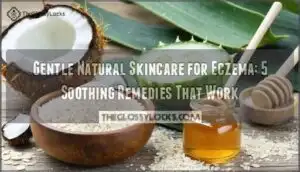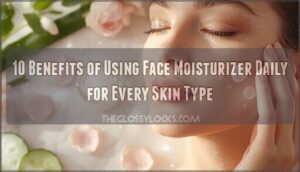This site is supported by our readers. We may earn a commission, at no cost to you, if you purchase through links.

You’ll want to reach for proven soothers like colloidal oatmeal, which acts like a protective blanket for irritated skin, or raw honey that works overtime to heal and calm inflammation.
Coconut oil isn’t just for cooking—it creates a barrier that locks in moisture while fighting bacteria.
Aloe vera gel straight from the plant offers instant cooling relief, while shea butter provides deep hydration without clogging pores.
These nature-powered ingredients work because they strengthen your skin’s protective barrier rather than stripping it away.
The secret lies in understanding which combinations deliver the most powerful relief.
Table Of Contents
- Key Takeaways
- Eczema Skin Care
- Gentle Skincare Routine
- Natural Eczema Remedies
- Preventing Eczema Flareups
- Effective Eczema Treatments
- Frequently Asked Questions (FAQs)
- What is the best natural product for eczema?
- Can children safely use natural eczema products?
- How long before natural remedies show results?
- Are natural treatments safe during pregnancy breastfeeding?
- Can natural skincare replace prescription eczema medications?
- Which natural ingredients should sensitive skin avoid?
- Conclusion
Key Takeaways
- Choose proven natural ingredients – You’ll get the best results from colloidal oatmeal, raw honey, coconut oil, aloe vera, and shea butter since they’re scientifically backed to reduce inflammation and strengthen your skin barrier.
- Start with gentle moisturizing – You can’t skip daily hydration with natural emollients containing ceramides and hyaluronic acid, as consistent moisture creates a protective shield against flare-ups.
- Avoid harsh chemicals and triggers – You’ll prevent worsening symptoms by eliminating synthetic fragrances, sulfates, and identifying your personal food triggers through careful elimination diets.
- Practice holistic care – You need to combine topical natural remedies with stress management, quality sleep, and proper hydration since your skin heals best when you address both external and internal factors.
Eczema Skin Care
If you’re dealing with eczema, your skin craves gentle care that won’t trigger more irritation.
Natural ingredients like coconut oil, aloe vera, and colloidal oatmeal can provide the soothing relief your skin needs without harsh chemicals that make things worse.
Natural Ingredients for Relief
When battling eczema’s relentless itch, nature’s pharmacy offers proven allies that’ll make your skin sing with relief.
Herbal anti-inflammatories like chamomile and licorice cream target redness effectively, while essential fatty acids from evening primrose oil restore your skin’s natural barrier.
Manuka honey varieties provide antibacterial protection, ceramide sources rebuild damaged skin, and probiotic benefits support healing from within for natural eczema treatment.
Avoiding Harsh Chemicals
Your skin doesn’t need a chemistry lab on its surface.
Synthetic fragrances and harsh preservatives can trigger flare-ups faster than you’d expect. Choose sulfate alternatives and natural cleansers that won’t strip your skin’s protective barrier.
Petrochemical avoidance becomes your best friend when selecting gentle eczema products. These chemicalfree options support natural eczema relief without compromising your nonirritating skincare routine.
Importance of Moisturizing
Moisture acts like your skin’s best friend, creating a protective shield that keeps eczema flare-ups at bay.
Daily moisturizing with quality emollient types containing ceramides and hyaluronic acid strengthens barrier function while maintaining ideal hydration frequency.
Choose natural eczema relief products with proven moisturizer ingredients for long-term benefits and healthier skin hydration.
Consistent moisturizing can also lead to younger looking skin, resulting in overall healthier skin.
Gentle Skincare Routine
You’ll want to create a skincare routine that works with your sensitive skin, not against it.
The key is choosing gentle, natural ingredients that calm inflammation while strengthening your skin’s protective barrier.
Coconut Oil Benefits
Within your daily skincare routine, coconut oil acts like a protective shield against harmful bacteria that love to crash eczema’s party.
This natural powerhouse boasts antimicrobial properties that specifically target S. aureus, a troublesome bacteria often found on eczema-prone skin.
You’ll want to gently massage virgin coconut oil onto damp skin using circular motions for ideal skin barrier repair and moisture retention.
Aloe Vera for Soothing
Pure aloe vera gel delivers instant cooling relief to irritated eczema patches.
You’ll find the best results using fresh gel from an aloe plant or selecting products with 99% aloe content.
Apply thin layers twice daily, avoiding synthetic additives that can trigger flare-ups.
This gentle natural ingredient reduces inflammation while hydrating damaged skin barriers effectively.
Many seek aloe vera products for eczema relief.
Oatmeal for Exfoliation
Forget harsh scrubs that leave your skin feeling raw.
Colloidal oatmeal offers gentle exfoliation that works perfectly for eczema skincare, removing dead cells without irritation.
This natural remedy provides soothing relief while strengthening your skin barrier.
You’ll find oatmeal exfoliation benefits include reduced inflammation and improved moisture retention, making it ideal for sensitive skin requiring careful attention.
A morning routine should include gentle cleansing techniques for superior results.
Shea Butter for Hydration
Rich shea butter transforms dry, irritated skin into a comfortable barrier against eczema flareups.
Nature’s gentle embrace soothes your skin’s deepest needs with transformative healing power.
This African treasure offers deep hydration through natural vitamins A and E.
Here’s how shea butter benefits your eczema skincare routine:
- Raw shea butter grades provide maximum healing compounds without chemical processing
- Sustainable sourcing guarantees quality while supporting communities that harvest this natural ingredient
- Shea butter alternatives like cocoa butter work if you’re allergic to tree nuts
- Refining shea butter removes allergens but may reduce beneficial properties for sensitive skin
Apply this gentle eczema moisturizer twice daily for maximum hydration results.
Natural Eczema Remedies
When your skin feels like it’s staging a rebellion, natural remedies can offer gentle relief without the harsh side effects of conventional treatments.
These plant-based solutions work with your skin’s natural healing processes to calm inflammation and restore your skin barrier.
Colloidal Oatmeal for Itching
Colloidal oatmeal transforms ordinary baths into therapeutic experiences that calm irritated skin naturally.
When you dissolve these finely ground oats in water, they release compounds called avenanthramides that reduce inflammation and create a protective barrier.
The milky solution coats your skin, trapping moisture while delivering gentle itch relief. You’ll find colloidal forms in specialized creams and bath products, though grinding regular oats works too for budget-friendly relief.
For convenient options, consider exploring a colloidal oatmeal bath.
Tea Tree Oil for Inflammation
Tea tree oil naturally fights inflammation through its active compound terpinen-4-ol, which reduces inflammatory cytokines in eczema-prone skin.
Always dilute to 1-2% concentration in carrier oils like coconut or jojoba to prevent irritation. Apply twice daily to calm areas, avoiding open wounds.
Epsom salt baths can also strengthen the skin barrier. This natural anti-inflammatory ingredient shows 72% improvement rates in clinical studies for eczema natural treatment.
Manuka Honey for Healing
Beyond addressing inflammation, you’ll find manuka honey’s wound healing properties particularly effective for damaged eczema skin.
Manuka honey transforms damaged eczema skin into healing powerhouse naturally.
Clinical studies show manuka honey substantially reduces lesion severity within seven days while accelerating skin repair. Manuka honey’s efficacy can be attributed to its ability to act as a natural skin humectant.
Here’s what makes manuka honey exceptional for eczema natural treatment:
- Honeys antibacterial properties fight Staphylococcus aureus infections that worsen eczema flares
- Wound healing acceleration occurs through moisture retention and barrier restoration
- Manuka grades (UMF 10+ recommended) indicate therapeutic potency for skin healing
- Cream formulation options blend honey with carrier ingredients for easier application
Studies demonstrate honey versus eczema works through multiple pathways – reducing inflammation, preventing secondary infections, and promoting tissue regeneration. The natural remedies approach shows consistent eczema relief without harsh side effects.
Licorice Cream for Redness
Frequently, dermatologists recommend licorice cream as nature’s anti-inflammatory powerhouse for stubborn eczema redness.
This gentle alternative contains glycyrrhizin, which naturally calms irritated skin without harsh chemicals.
You’ll find 2% concentrations work better than weaker formulations for reducing swelling and discomfort.
| Licorice Benefits | Application Tips |
|---|---|
| Natural anti-inflammatory properties | Apply twice daily to clean skin |
| Reduces redness and swelling | Use thin layer, massage gently |
| Soothes irritated areas | Test patch first for sensitivity |
| Alternative to harsh treatments | Store in cool, dry place |
Preventing Eczema Flareups
Preventing eczema flare-ups means staying one step ahead of the triggers that irritate your sensitive skin.
You’ll need to identify your personal culprits—whether it’s stress, certain foods, or simply not getting enough sleep—and make small but powerful changes to keep your skin calm and happy.
Identifying Trigger Foods
Among all the potential culprits, certain foods can trigger eczema flare-ups faster than you’d expect.
Food allergies, especially to cow’s milk, eggs, and nuts, often spark inflammation. Start elimination diets by removing common allergens for two weeks, then reintroduce them gradually.
Reading labels becomes vital since hidden ingredients lurk everywhere. Poor gut health amplifies trigger foods’ effects, making identification essential.
The process involves careful management, including the removal and reintroduction of potential allergens to pinpoint the trigger foods.
Managing Stress
Your body’s stress response directly impacts eczema flare-ups through the mind-body connection. When you’re overwhelmed, stress hormones trigger inflammation and disrupt gut health, worsening symptoms.
Practice relaxation techniques like meditation or deep breathing to support emotional wellbeing. Simple lifestyle changes—listening to calming music, gentle NLP eczema exercises, or regular stress management routines—can dramatically reduce flare-ups and improve your skin’s healing response, promoting overall wellbeing.
Importance of Sleep
Quality sleep isn’t just beauty rest—it’s your skin’s prime healing time.
During deep sleep, your body ramps up skin repair and boosts immune function, helping fight eczema flare-ups.
Poor sleep increases stress hormones that trigger inflammation, making gentle remedies less effective.
Prioritizing seven to eight hours nightly supports your healing process naturally.
You can also try chamomile’s soothing effects to enhance relaxation.
Staying Hydrated
After quality sleep, your body’s next ally is proper hydration.
Drinking enough water supports your skin barrier function and helps maintain natural skin moisture from the inside out.
Aim for eight glasses daily, and consider hydrating foods like cucumber and watermelon.
Good water intake with balanced electrolytes keeps your skin plump, reducing dry skin that triggers eczema flares, which is crucial for maintaining healthy skin and overall well-being.
Effective Eczema Treatments
You’ve probably tried countless eczema treatments, but finding the right combination of natural remedies can finally give your irritated skin the relief it’s been craving.
The key isn’t just picking any natural ingredient—it’s about understanding which treatments work best for your specific skin needs and how to use them effectively.
You’ve probably tried countless eczema treatments, but finding the right combination of natural remedies can finally give your irritated skin the relief it’s been craving.
The key isn’t just picking any natural ingredient—it’s about understanding which treatments work best for your specific skin needs and how to use them effectively.
DIY Skincare Recipes
With kitchen ingredients at your fingertips, you can whip up effective homemade remedies that rival store-bought options.
Try mixing coconut oil with honey for an eczema cream natural blend, or combine oatmeal with aloe vera for gentle relief.
Recipe Customization lets you adjust ratios based on your skin’s needs, while proper Ingredient Sourcing guarantees quality.
Store mixtures in cool, dark places for freshness, and always patch-test first for Safety Precautions.
Store-Bought Natural Creams
Three top-rated storebought natural creams offer proven eczema relief cream options.
Aveeno Eczema Therapy uses colloidal oatmeal and ceramides, earning National Eczema Association approval through clinical studies.
Eczema Honey’s organic eczema cream blends honey with beeswax for natural skincare that’s gained 5,000+ positive reviews.
Pipette’s steroid-free formula provides safe, effective relief for families seeking trusted storebought natural creams.
A clinical trial explores the use of beneficial bacteria cream to treat eczema.
Key Ingredients to Look For
When shopping for eczema cream natural options, focus on proven powerhouses.
Ceramide Benefits include restoring your skin’s protective barrier—look for creams with these lipid heroes.
Colloidal oatmeal reduces inflammation by 60% in clinical trials.
Manuka Honey Varieties offer antimicrobial protection, while Essential Oils like tea tree provide gentle anti-inflammatory relief.
Herbal Extracts such as calendula show 80% redness reduction, making organic eczema cream truly effective for sensitive skin eczema management.
Balancing Skincare and Lifestyle
While the right natural ingredients form your eczema skincare routine foundation, true healing happens when you pair topical care with holistic wellness.
Your mind-body connection affects skin health more than you’d think, and environmental factors like clothing choices matter too.
Here’s how to balance both approaches:
- Exercise Impact: Light movement boosts circulation without triggering sweat-induced flares
- Environmental Factors: Choose breathable fabrics and maintain consistent indoor humidity levels
- Mind-Body Connection: Practice stress management since cortisol directly worsens inflammation
Smart lifestyle tips complement your natural ingredients strategy, creating thorough eczema management that addresses root causes.
Frequently Asked Questions (FAQs)
What is the best natural product for eczema?
Like finding gold in your medicine cabinet, colloidal oatmeal stands out as nature’s best eczema remedy.
You’ll get anti-inflammatory benefits that reduce itching while it locks moisture into your skin, making it gentle enough for daily use.
Can children safely use natural eczema products?
Children can safely use most natural eczema products, but you’ll want to patch test first.
Ingredients like colloidal oatmeal, shea butter, and aloe vera are generally gentle for kids’ sensitive skin.
How long before natural remedies show results?
Wondering when you’ll see improvement?
Natural eczema remedies typically show initial results within 1-2 weeks of consistent daily use.
Though full benefits may take 4-6 weeks as your skin barrier rebuilds.
Are natural treatments safe during pregnancy breastfeeding?
Most natural eczema treatments are safe during pregnancy and breastfeeding.
You’ll want to avoid essential oils like tea tree and stick with gentle options like coconut oil, aloe vera, and oatmeal-based creams for peace of mind.
Can natural skincare replace prescription eczema medications?
Natural remedies can’t completely replace your doctor’s prescriptions, but they’re surprisingly powerful allies that can reduce your reliance on medications when used alongside proper medical care.
Which natural ingredients should sensitive skin avoid?
You should avoid essential oils like tea tree, lavender, and eucalyptus as they’re common allergens. Skip fragrances, preservatives, and citrus extracts that can trigger reactions and worsen inflammation.
Conclusion
Your skin will feel like it’s been kissed by the gentlest spring breeze when you embrace gentle natural skincare for eczema.
These five remedies aren’t just trendy—they’re backed by real science and centuries of healing wisdom.
You’ll find that colloidal oatmeal, honey, coconut oil, aloe vera, and shea butter work together like a dream team for your irritated skin.
Start slowly, patch-test everything, and remember that consistency beats perfection every time.
- https://www.dermatologytimes.com/view/manuka-honey-tested-ad-treatment
- https://pmc.ncbi.nlm.nih.gov/articles/PMC3949697/
- https://www.naturopathica.com/blogs/news/manuka-honey-for-eczema-is-manuka-honey-good-for-eczema
- https://scratchsleeves.co.uk/scratchsleeves-blog/alternative-remedies-3-is-manuka-honey-good-for-eczema/
- https://www.prettyorganicgirl.com/eczema













